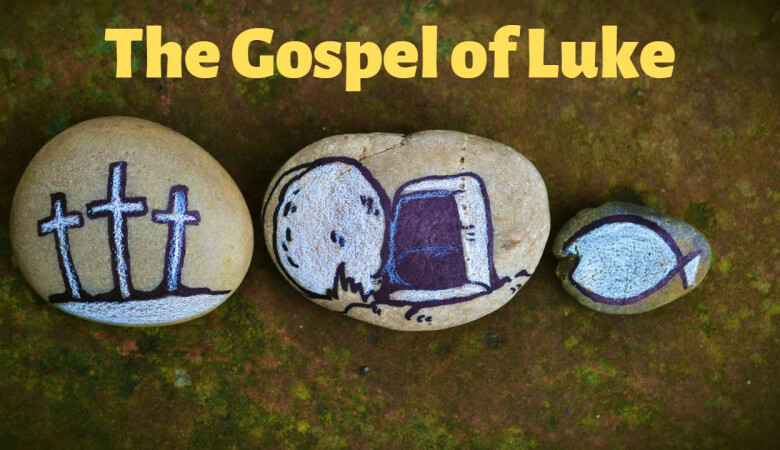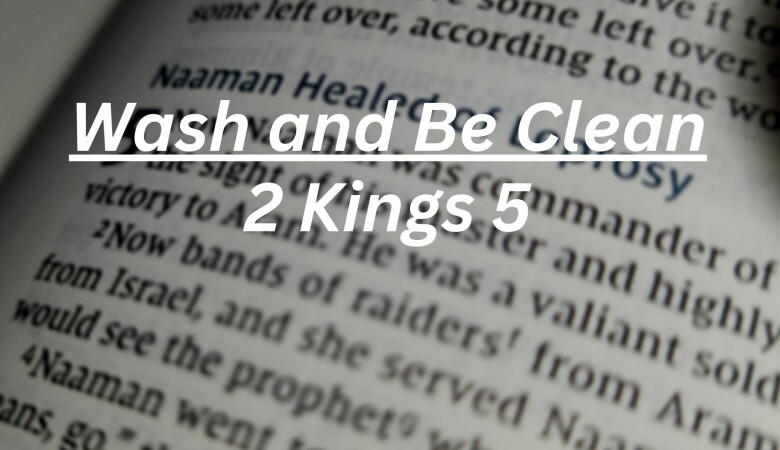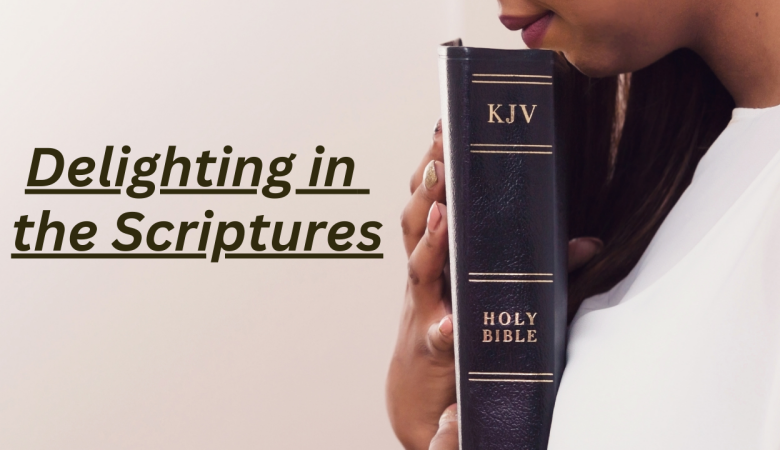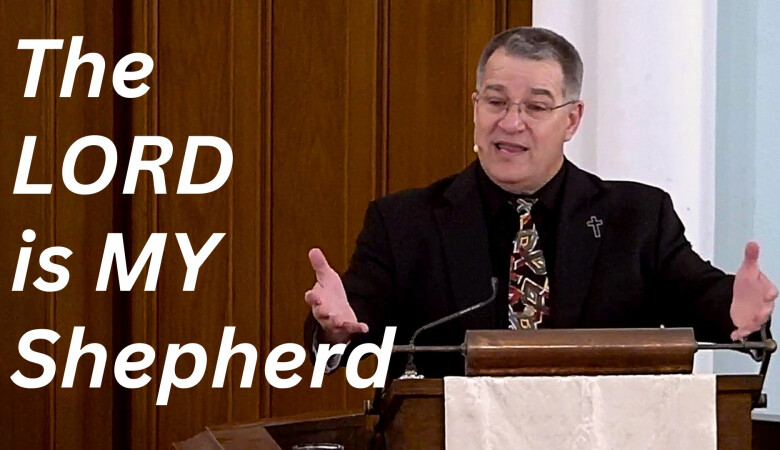Series: Guest Preachers
What Prayer Is
June 18, 2023 | Bruce Weatherly
Passage: Psalms 5:1-3
See Entire Series Here
Summary
Almost everyone prays. But what is prayer? More importantly how would God direct us to pray. All important questions David considers as he contemplates his difficult situation in Psalm 5.
transcript
Now this morning, the name of what I'm speaking to you about, the sermon is what prayer is. And Psalm 5, but I'm just going to be focusing on the first three verses this morning. So it's good that we read the whole thing.
Let's read. I use the NIV, New International Version, the old one. And let me read those verses from my Bible.
Psalm of David, "Give ear to my words, O Lord. Consider my sighing. Listen to my cry for help, my King and my God, for to you I pray. In the morning, O Lord, you hear my voice. In the morning, I lay my requests before you and wait in expectation."
So in preparing-- I'm doing something a little different this morning. In preparing, I started writing. And I decided that what I had written, I probably couldn't say any better than what I had written. So I'm going to be reading to you. Not just reading, but I'm going to be reading to you. But it's from my heart. And it's what I wrote.
And so here we go. There's different kinds of prayer and different ways we pray. And we see this in this psalm. In my NIV, there's a note here for Psalm 5. "The morning prayer, perhaps offered at the time of the morning sacrifice, is the psalmist's cry for help when his enemies spread malicious lies to destroy him." So that's the context.
We say, well, how's that going to apply to us? I don't really have any enemies. Winston Churchill said, “never trust a man who doesn't have enemies.” I don't know. Right now, I don't have any that I know of. But we all have enemies. And they're invisible. But they're there, and they're real, and they hate us. And they're always there. And they bug us every day. And I can prove it.
Ephesians 6, 12-- I got these little tabs of paper, but they don't always help when your hands are shaking. Ephesians 6, 10 to 12, "Finally be strong in the Lord and in his mighty power. Put on the full armor of God so that you can take your stand against the devil's schemes, for our struggle is not against flesh and blood, but against the rulers, against the authorities, against the powers of this dark world, and against the spiritual forces of evil in the heavenly realms."
We all-- if you're in Christ, you have enemies, and a lot of them. And they hate you. And they're out to destroy your faith. Good thing the Holy Spirit in us is more powerful. Greater is he who is in you than he who is in the world.
This morning, I'm talking about prayer.
Like I said, there's different kinds of prayer. This morning, I'm talking about prayer time prayer, private prayer, go to a lonely place and pray their prayer. Some have called it closet prayer all day long or without ceasing prayer. That's what I'm talking about this morning.
So let's look at verse 1. "Give ear to my words, O Lord. Consider my sighing."
So we see that sometimes prayer is words. Sometimes it isn't. Sometimes it's just sighing or groaning without words. Sometimes there are no words. And that's OK.
That's OK with God. That's OK with your father. Well, you don't have to turn there, but Romans 8, 22 to 27, you're familiar with it. We know that the whole creation has been groaning, as in the pains of childbirth right up to the present time. But not only so, but we ourselves, who have the first fruits of the Spirit-- excuse me, that's not the fruit of the Spirit. That means we have the Holy Spirit as the first fruit, as the deposit, as the guarantee that because we have the Holy Spirit living in us, we are definitely going to get all the rest. That's what that means by the first fruits of the Spirit.
Who have the first fruits, but we ourselves, who have the first fruits of the Spirit, grown inwardly as we wait eagerly for our adoption as sons, the redemption of our bodies. It's hard to be a Christian in this world, living in these bodies.
It's hard.
For in this hope, we were saved, the hope of the redemption of our bodies. And in the Bible, hope doesn't mean, I hope that's going to happen. Hope is looking forward to with certainty, in this sense of the word in the scriptures.
For in this looking forward to with certainty, we were saved. But hope that is seen is no hope at all. Who looks forward to what he already has? But if we look forward to with certainty, what we do not have yet, we wait for patiently. The redemption of our bodies, leaving these bodies to be with Christ for eternity. In the same way, the Spirit helps us in our weakness. We do not know what we ought to pray for, but the Spirit himself intercedes for us with groans that words cannot express. And very often, we groan right along with him. And he who searches our hearts knows the mind of the Spirit because the Spirit intercedes for the saints in accordance with God's will. And he who searches our hearts knows the mind of the Spirit because the Spirit intercedes for the saints, for us, in accordance with God's will.
And that's a good thing, that it's in accordance with God's will because we don't always pray in accordance with God's will and actually deep, deep inside what we want, whether you know it or not. What you really want is God's will.
So in other words, we can't lose.Even when we pray ignorantly, God knows what we really mean and what we really want. And that's what he gives us, what we really mean and what we really want, which again is his will.
So we can't lose, even if we pray awry. You don't really have to be careful what you pray for because God's only going to give you his will. And that's good. And that's a good thing.
Let me read something to you.
Jean-Pierre de Cossade was a, I don't know, 17th century, 16th century Roman Catholic spiritual director in a monastery, I guess. And he had this to say about the will of God.
“The will of God has nothing but sweetness, grace, and treasures for the surrendered soul. It is impossible to place too much confidence in it or to surrender oneself to it too utterly.
I'm going to read that again later. It reminds us of Jesus in the garden, Mark 14, 35 and 36. Take this cup from me, yet not what I will but what you will. Jesus knew this. Hopefully we know it. Hopefully we shudder at the thought of getting anything but God's will.
I do, but I don't have to because God's going to give us his will. But I shudder at the thought of getting my will instead of his. We don't want to insist on our will, no matter how painful it is, whatever we're going through. We want his will. Believe me, if you're a Christian, you want his will more than anything, more than your own.
So prayer, back to verse 1, prayer doesn't have to be words. God already knows.
Prayer is just communing. Sometimes prayer is just fellowship with God, without words. It's just relating with him from deep inside.
Prayer is God already knowing and understanding what you're feeling even when you don't. Prayer is God already knowing and understanding what you're feeling even when you don't.
Just read a few verses out of Psalm 139, verses 1 to 4. Oh, Lord, you have searched me and you know me. You know when I sit and when I rise, you perceive my thoughts from afar. You discern my going out and my lying down. You are familiar with all my ways.
I like the way New American Standard says it. You are intimately acquainted with all my ways. All my outer ways, all my inner ways. There's no deep inner idiosyncratic weird ways that you have that God doesn't know and love you anyway. He is intimately acquainted with all your ways outside and inside. Why? Because later in the Psalm it says, he created your inmost being. He knows you. He knows you.
And that isn't a scary thing if you're in Christ.
Before a word is on my tongue, you know it completely, O Lord.
In Psalm 51:6, David says, surely you desire truth in the innermost being. You teach me wisdom, you teach me the fear of you in the inmost place. Surely you desire truth in the innermost being.
God wants you to be honest with him. He already knows and he wants you to be honest. See, however you're coming to God in any given moment is good. However you're coming to God in any given moment is good.
Here's my definition of prayer. Prayer, hopefully just not my definition. Prayer is coming to God with whatever is really going on inside of you in whatever way you're coming. Prayer is coming to God with whatever is really going on inside of you in whatever way you're coming. That's prayer.
As I said, there's different kinds of prayer. But this is all day long prayer. Closet prayer, this is prayer time prayer. As Peter said a few weeks ago in his sermon, well before I, I'm skipping ahead here. The point I'm making is that God is a good dad.
And as Peter did talk about a few weeks ago relating to God as father, as dad is difficult for some, is pleasant for others, and kind of in between for others, you know. I had a good dad for about three years as a teenager. It was good.
For some, God is the good dad you always wanted. He desires, he's a good dad. He desires truth in the innermost being and he already knows.
And as Peter said a few weeks ago, God wants to be included in everything you're concerned about. There's nothing you're concerned about that he doesn't care about and doesn't want to be included in, nothing.
That has some huge implications. He wants to be included in everything you're concerned about. Everything that concerns you. He wants to be included in your world. He wants you to include him in your world, your inner world. He hears everything, including when there are no words.
So prayer is communing with someone who already knows. If you're in Jesus, prayer is communing with someone who reads your mind and rejoices over you with singing no matter what he sees there. If you're in Jesus, prayer is communing with someone who reads your mind and rejoices over you with singing no matter what he sees there. One of Larry Crab is a deceased, but he was a Christian psychologist. And he had a prayer. He said, God, help me to believe the truth about myself, no matter how beautiful it may be. Another quote, and I want you to see if you can tell me who this is.
“He sees you deep. He knows your needs even before you ask.”Anyone want to take a guess? Peter, you know. Huh? No? No. Bob Dylan. Dylan. Dylan in a song called When He Returns. I tried to sound a little like him, but I, you know. That's a challenge. He sees you deep. He knows your needs even before you ask.
Yeah.
Verse two. So, back to Psalm five. So, give here to my words, O Lord, consider my sighing. Listen to my cry for help, my king and my god, for to you I pray. So sometimes prayer is words, sometimes prayer is sighing or groaning without words. Sometimes it's just a cry for help. Many times during the day, isn't it?
Every year my son and I go on our annual Prescile Bay fishing trip. And we had a great time, great weather two weeks ago, a couple weeks ago up there, caught a lot of bass.
And we went, we were fishing on Wednesday, Thursday, and what we planned to be all day Friday, but it turned out to be half a day Friday.
After lunch, we began fishing again. And Nate always brings his dog. And his dog's name is Rowan, believe it or not. I think it's Celtic, it means little red one. And Nate has a Vyshla, which is a Hungarian pointer, which is now about this tall and like 60 pounds. But as a little puppy, and they're red, they're reddish colored.
And so, Rust, and so they named him Rowan. So we had finished lunch and we were in the boat. And you all know what a bass lure looks like. This one was about three, four inches long and had three treble hooks.
You know what treble hook is? It's like a hook with three hooks on it. And had three of those. And all of a sudden, as we're fishing, we see Rowan getting frantic. And evidently he had gone to sniff this bass lure, got stuck in his nose. He panicked.
And the whole lure was in his mouth. And he was, he was panicking. I mean, there was one in his nose, there was one going through his, in front of his tongue, one in the back of his tongue, and one in his cheek. The whole lure was in his mouth.
And he's chomping and the more he thrashed, the more, the worse he made it. Oh, people are leaving, did I, is it getting too disturbing? It has a happy ending.
So Rowan is, is, is thrashing. And Nate, Nate grabs him and, and to hold him, to restrain him so he won't thrash. Rowan, please stop, stop, stop buddy, please stop. And he's holding him and Rowan calms down.
And so we quick go into the, we were right across the bay from a gas dock. We went in and the guy let us put the boat there and he drove me to my son's, my son's name is Nathan, we call him Nate. He drove me to Nate's car. And I unhooked the trailer and I drove back, because our plan, of course, was to take Rowan to the, an emergency, to, to the vet, to an animal hospital. Which we did some research on the phone and found one. So we, we get in the car and Nate is sitting in the front seat, the passenger seat with Rowan holding him.
And I'm about to drive. And Rowan starts thrashing again. And Nate, please, and I'm sure Nate was praying also. Rowan, please stop, stop. And I, I did, I just put my head down and, and just said “dad, dad, dad, dad.”
I didn't know what else to say. In my heart.
And and I picked up my head and Rowan was, sit, was on Nate's lap with his head over the back of the seat. And I looked. And I said, Nate, the lure's not in his mouth anymore.
Nate, and I couldn't, Nate says, where is it? And I looked and there was one little section in his paw and the rest was starting to go into Nate's shoulder. [LAUGH] Just hung up in his shirt. So he said, cut my shirt. So I took my knife and I cut his shirt. And then we had some clippers and we clipped off the hook so that all that was remaining was one part of the treble hook in the webbing between Rowan's pads on his right front paw. But, and so we had, there's the hook with the shirt hanging from it.
And but that, that was it. He evidently had thrashed and batted and it came out. There was no way that hook was, that lure was coming out of his mouth without surgery of some sort. It was in. You know what hooks are. They've got a barb on them and once they're in, and all three of them were in there.
Sometimes prayer is just crying out.
And look at verse three. In the morning, O Lord, you hear my voice. In the morning I lay my request before you and wait in expectation.
Sometimes prayer is out loud and more structured. Morning is a good time to pray. Sometimes prayer is requests. When it is, it always involves waiting. Waiting maybe for a few seconds or it may be for a lifetime.
And this prayer is a picture of the morning sacrifice. It's interesting. He says I lay my requests before you and it's like in the morning sacrifice, it was like you laid the sacrificial items, you arrayed them in a row kind of, and waited for God to accept them. I kind of pictured Elijah on Mount Carmel laying everything out and praying and oof, you know, and the rocks, the water, the thing. But this prayer is, I know, is maybe on the occasion of the morning sacrifice. And so sometimes prayer is more structured and it's, you set an array and you come to God and sure.
I lay my request before you. I arrange in order. I set in a row. I array, we array our requests and wait. Sometimes we'll have to wait a long time. Sometimes we'll have to wait until we leave these bodies.
Sometimes we'll have to wait until we leave these bodies to get what we requested or to understand and rejoice in why we didn't. God doesn't always give us what we request, but he always gives us what we really wanted when we request it.
Matthew 19, I'm just gonna read one verse to you. Or well, it's probably a little more, 28 and 29. “I tell you, Jesus said to them, I tell you the truth that the renewal of all things when the Son of Man sits on his glorious throne, you who have followed me will also sit on 12 thrones, judging the 12 tribes of Israel. And everyone who has left houses or brothers or sisters or father or mother or children or fields for my sake will receive 100 times as much and will inherit eternal life.”
I guess where I saw that fitting in is, he says, everyone who has left houses or brothers or sisters or father or mother. And maybe we could even say, and I bet, I think we can, and everyone who has gone without or who goes without brothers or sisters or father or mother or children or fields for my sake will receive 100 times as much and will inherit eternal life.
I know several people who prayed for very significant things in their lives that we all kind of take for granted. And as yet haven't gotten them. Meanwhile, during this waiting, meanwhile we trust him, we pray not yet, not what I will, but what you will.
In Jesus's case, Jesus himself in the garden didn't get what he requested, did he? “Take this cup from me.” It didn't happen. He had to go through what he had to go through. But he did get what he really wanted, which was God's will. “Yet not what I will, but what you will.”
And the more we know God and his love, the more we're going to be able to pray that way without fear and trembling. Let me read that quote again.
“The will of God has nothing but sweetness, grace and treasures for the surrendered soul. It is impossible to place too much confidence in it or to surrender oneself to it too utterly.”
It's a wonderful, blessed quote. So when prayers requests, it needs to involve waiting and expectation. Looking forward to being answered. A peering into the distance. Watching for the answer. Kind of like the prodigal son's father, huh? You know he prayed for his son, his lost son. Intensely and every day. And he looked. He peered into the distance often and one day he saw his son coming.
Requests always involve waiting and expectation. Otherwise, why ask? And it's not a matter of if, as far as receiving, it's a matter of when we always get what we really want. We always get God's will. That should be needs to be a comforting thing as opposed to ours, even Jesus.
Yet not what I will, but what you will. Try to figure that out. It's not a matter of if, it's a matter of when, it's the how. That is often different than what we expected. In our small group, we have a small group Bible study that we do and at my house or different houses. And a part of it is before we study, we pray together. And we always keep a list, a written record of what we're praying about, what we're praying for, and each week then we go back and we check. And there's a blessing when we see prayer answered, you see. But we keep praying and we keep going back and checking and looking for the answer, you see.
That's an important part of, that's what David says, right? “I lay my requests before you and wait in expectation.”
There isn't even a comma there. Part of the, it's all part of praying. So in conclusion, sometimes prayer is words, often it's not. Sometimes prayer is simply sighing and groaning. And God knows your heart and he cares and he understands exactly what you're really wanting.
You'll always get what you really want. Sometimes it's a crying out. Sometimes it's more structured and involves the voice. Sometimes it's a laying out of requests and involves waiting and expectation appearing into the distance.
Amen?
Let me pray for us. Father, you yearn to be included in everything going on in our lives and in ourselves, no matter what it is. That we would include you in our world. That we would come to you in whatever way we're coming to you and know it's okay. And know that you hear us however we're coming. O Dad, Lord, Holy Spirit, thank you.
Amen.
Series Information
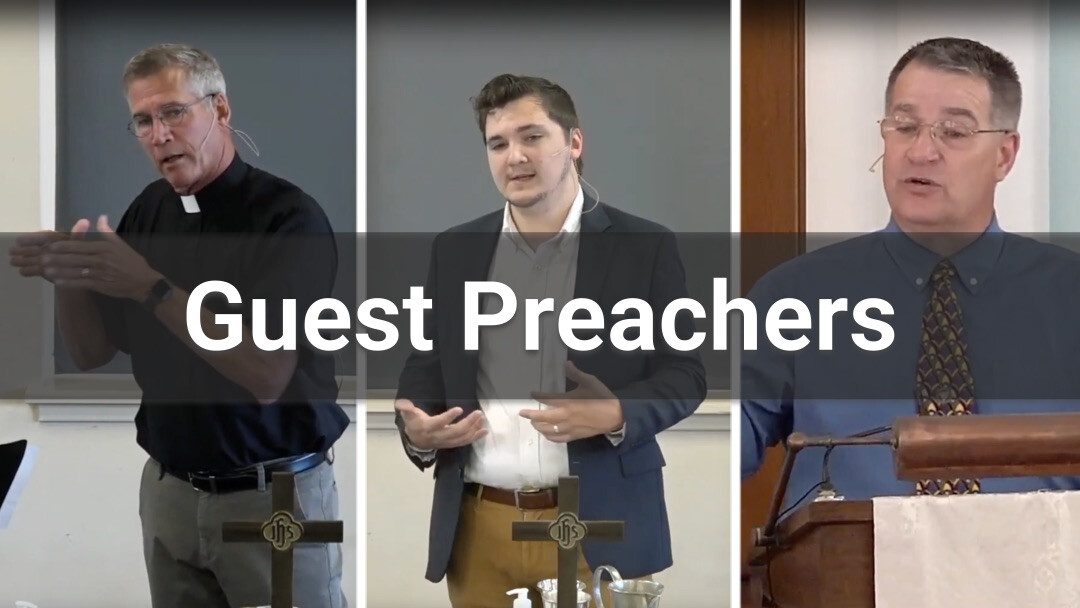
When Pastor Peter is away Second City Church is blessed to hear other men God has gifted to preach.

